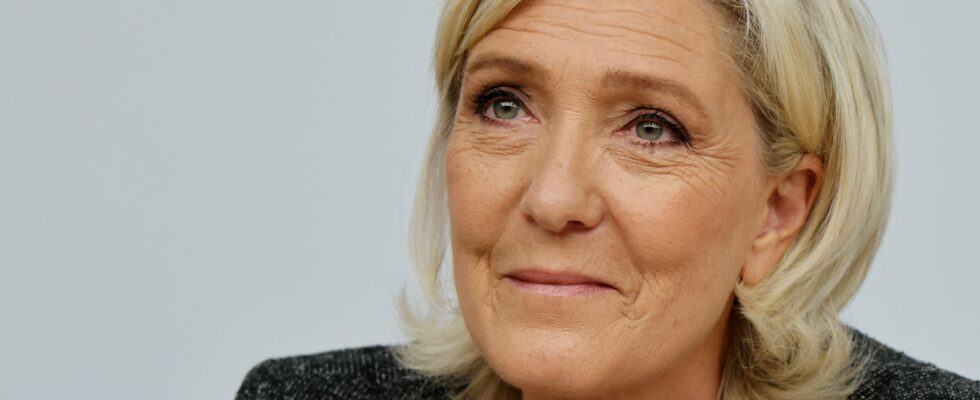The sentence was lost in limbo, spoken as the Prime Minister was about to leave the room. “Don’t worry, I’m going to invite you to lunch”: on September 24, Michel Barnier, all in his ode to respect which accompanies his arrival at Matignon, pushes the envelope as far as he can, even with his neighbor from at the moment, Marine Le Pen, during the conference of presidents at the National Assembly.
The remarks will not lead to any proposal, a simple 35-second phone call to the president of the RN group in the Assembly, a few minutes later, will ignite the powder and divide even those close to him: some will find that it is well played, that the mark of Michel Barnier is precisely to be able to speak to the RN as well as to the socialists. Others will be moved, who were elected against an RN candidate after the dissolution. For her part, Marine Le Pen commented: “Public insults and private apologies don’t interest me.”
Monday, the RN deputy will not come to Matignon for lunch. And when he brings Marine Le Pen into his office – she should be the first of the opposition leaders to be received, “a coincidence of timing” they say to Matignon – the Prime Minister will not tell the usher : “Bring in Madness, banish Reason!” The quote, taken from Shakespeare’s King Lear, serves as an exergue to The great illusion, Secret Brexit Diary written by Michel Barnier. He’ll just think it.
The warning that opens his book
In the pages that follow, it is with a quote… from Marine Le Pen herself that he begins the “warning” which opens his book: “We vibrate with the British who have seized this extraordinary opportunity to escape from the servitude.” The Brexit negotiator then notes that the leader of the RN is “opportunistically” asking for the same referendum in France as in England.
Michel Barnier-Marine Le Pen, everything opposes them on the political level. Already Le Pen senior, 20 years ago, relied on the writings of the former Commissioner of Brussels to say: “What an admission! What excess frankness, which corresponds very exactly to what we have stopped saying for decades : European construction means the destruction of France.” It was June 2004.
Marine Le Pen is not Jean-Marie, but Michel Barnier remains Barnier. They don’t know each other. On September 24, arriving very late at the National Assembly, she even formally introduced herself by sitting next to him, triggering laughter from those present. When he tries to contact her, to correct the comments of the Minister of the Economy Antoine Armand, the head of government does not even have her telephone number.
He, in his long political career, has never been confronted electorally with the extreme right – his lands in Savoy have long been spared from it – and has no personal dispute with the party leaders. She, from the outset, warned her collaborators: as much as she had boycotted Gabriel Attal the junior, delegating Jordan Bardella for consultations at Matignon, she would go see Michel Barnier the senior.
So in the beginning was the blue sky. When he arrives in Matignon, the Savoyard and his friends are convinced of one thing: Marine Le Pen is his best ally. Not because they have concluded a secret pact, but because she is powerful: she forces this common base which does not look like much to at least come together against her. “As long as Marine Le Pen feels strong, she will not want to bring down Michel Barnier,” confides a friend of the Prime Minister, while another adds: “The day she falls, everything changes.”
Did this day arrive on November 14, with the prosecution’s requisitions raising the possibility of the immediate ineligibility of the candidate for the Elysée? Nobody knows. “Marine Le Pen has two news, judicial and personal [NDLR : avec les inquiétudes sur la santé de son père]”, notes a friend of Michel Barnier. With what consequences on politics?
To the former MEP Arnaud Danjean, now special advisor to the head of government, Jordan Bardella once explained: “The large majority of our electorate is anti-establishment, but the marginal electorate who makes us win is the one who wants to responsibility.” The RN group is today torn between these two lines: the fate of Michel Barnier largely depends on this dilemma.
At Bercy, we do the accounts, not the carpet merchants. At least not with the National Rally. The Minister of the Budget, Laurent Saint-Martin, in his role, does not see the point of giving victories to the RN, for example by making a gesture on the cost of electricity, since the party can only vote against the finance bill, the marker between majority and opposition.
At Matignon the angle of view is necessarily a little different. How far will Monday’s officially scheduled discussion on budgetary issues extend? Last Thursday, Elisabeth Borne had lunch with Michel Barnier. She puts forward another bargaining chip: “Either we are in the hands of the RN or we separate the socialists from the NFP. And there is one way to do it, it is the voting method for the legislative elections.” But she knows, she paid to see, that the right tenses up as soon as it hears the word “proportional”.
For the duration, uncertain as he constantly repeats, of his time at Matignon, Michel Barnier has privately set a political objective: “loosening the extremes”. Practical work begins on Monday. “For Brexit, underlines one of his followers, he managed to come to an agreement with the Hungarian Viktor Orban and Marine Le Pen knows that.” Bring in Reason, banish Madness…
.
